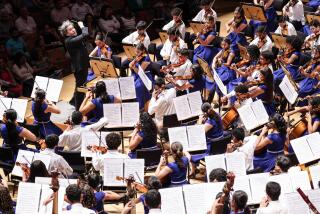MUSIC REVIEW : MEHLI MEHTA CONDUCTS YOUTH SYMPHONY GALA
Giganticism lives. The 17th annual gala benefit concert of the American Youth Symphony on Sunday evening was a big, big event in almost every way. A big crowd--a sellout--in a big place--the Dorothy Chandler Pavilion--for a big orchestra and big chorus, with at least one reasonably big-name soloist.
And, alas, middling performances of some big music. Music director Mehli Mehta led his cast of hundreds in a heaven-storming account of Beethovenâs Ninth Symphony that kept tripping over the little things. Such as intonation, ensemble coordination and even a miscue or two from the maestro, who worked as usual without the score.
The orchestra produced a lot of sound, easily dominated by the brass. Mehta urged careful attention to the composerâs dynamic markings, but transitions seemed square and his delineation of structure blunted details and emphasized the obvious.
Big sound turned out to be a vocal attribute. From the large UCLA Choral Union, much of it was shouted. Basso Michael Gallup introduced the âOde to Joyâ with slightly hoarse, stentorian vigor, and tenor Paul Johnson sang the March with cleanly projected tone and text. Soprano Mani Mekler and mezzo Rickie Weiner-Gole joined them in a well-balanced ensemble that survived Mehtaâs over-conducting.
Much rehearsal was apparent in the Ninth, but little or none in Paganiniâs Violin Concerto No. 1. Ivry Gitlis, the soloist, and Mehta stared fixedly at each other throughout, neither sure what might happen next.
Gitlis wanted an uncommon degree of flexibility. The first movement is practically one big cadenza, and the Israeli violinist felt free to stop and start, rush and dawdle, at will. This left Mehta and his orchestra, with reduced strings, hiccuping along behind, out of tune and badly balanced to boot.
It was not the best of nights for Gitlis in any case. The fireworks fizzled as often as they sparkled, and the hyper-Romantic now-you-hear, now-you-donât swellings in the melodies compounded the disjunct feeling. He wanted to play to the audience, occasionally striding forward a la Stern. But the necessity of locking eyes on Mehta always drew him back.
More to Read
The biggest entertainment stories
Get our big stories about Hollywood, film, television, music, arts, culture and more right in your inbox as soon as they publish.
You may occasionally receive promotional content from the Los Angeles Times.










